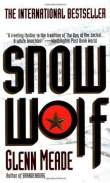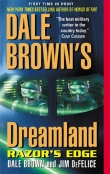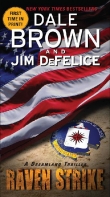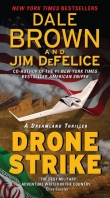
Текст книги "Black Wolf"
Автор книги: Dale Brown
Жанр:
Боевики
сообщить о нарушении
Текущая страница: 17 (всего у книги 24 страниц)
THE SHOW
49
Moldova
The first priority was securing the buildings and making sure there were no Wolves left. Boston took charge of that, organizing a room by room sweep of the main house. Meanwhile, the severely injured were tended to. Tiny had broken his leg in the fall, and his ribs had been shattered by the Wolf’s punch. The trooper shot in the leg had lost a great deal of blood. Danny decided to have the Rattlesnakes take both of them directly to the nearest hospital. The other wounds turned out to be relatively minor, handled by temporary stitches, and an ice pack and aspirin in the case of a sprained ankle.
They’d been lucky, Danny realized. They’d taken the Wolves by surprise with overwhelming force, protected by the best body armor in the world and aided by technology that should have made this a cakewalk. But in truth, they could have easily been overwhelmed if the Wolves had reached their weapons.
So who were these guys? And was Stoner here?
Danny asked himself both questions as he walked through the house. The muscles in his legs trembled ever so slightly, moving sluggishly, as if the op had changed the electrical impulses they used to communicate with the brain.
He stood over a body in the hallway on the second floor. It was facedown in a pool of blood, riddled with bullets—the man looked to have taken an entire magazine, if not two, before going down.
Was this Stoner?
Danny dropped to his knee in the pool of blood and turned the body over. It was heavy—he had to use both hands.
The body slumped against the opposite wall, head flopping. For a second Danny thought he was alive and jerked back.
A bit of skull fell away.
It wasn’t Stoner.
Danny rose, his stomach starting to turn.
Danny went from corpse to corpse, expecting each time to see Stoner. He was sure as he approached each body that this would be him—this would be the man, vaguely remembered, who had saved his life, and whose life he had saved.
Each time his throat thickened and his heart pounded faster. Each time his breath seemed to slip away. And then each time the face, battered by bullets and covered with blood, didn’t belong to Mark Stoner. It was too young, too long, too round, too blond, or too different.
As varied as their faces were, all of the Wolves had many physical traits in common. All were at least six feet, most much taller. They were bulked up with muscles that would have made a bodybuilder jealous. Several were wearing prosthetics and implants. The man who Nuri had killed after he jumped from the roof of the house had an artificial leg fused to his bone just below his hip. Another of the men, killed in the house, had an artificial arm. Three of the others had scars on their upper arms and calves; Danny guessed there were implants of some sort there.
They gathered the bodies so they could be evacked and inspected by the technical team that evening. Danny went down to the Moldovan police lines to look at the other Wolves who’d been killed.
The deputy minister met him on the road. Lacu’s face was ashen; for all his earlier enthusiasm, he clearly hadn’t counted on so much bloodshed.
“We’re just finishing a sweep right now,” Danny told him. “We want to make sure there are no more booby traps. We have specialists, bomb people. Once it’s secure, you can come in and take over.”
The Moldovan deputy minister nodded.
“Nuri?” he asked.
“He and your sharpshooter are fine. They, uh, they were shaken up a bit. But your man was very brave. They were both brave.”
Lacu didn’t smile, exactly, but his nod this time seemed more positive.
“I need to look at the dead men,” said Danny. “We’re going to have to do, uh, autopsies.”
“Autopsies?” The minister didn’t understand the English word.
“Inspect the dead, the… uh, have doctors look at the bodies.”
Lacu still didn’t understand. Danny decided he’d let Nuri explain it to him, and went over to check on the rest of the Wolves.
Stoner wasn’t among them. None of the men had exoskeleton gear either. A good thing, Danny decided; it would help preserve the fiction that this had only been a drug raid.
“One of my men will show you a clear path to the marijuana fields,” Danny told the deputy minister. “But you should approach it very, very carefully. We don’t think there are booby traps, but you never know. These guys were really well prepared.”
“Yes,” said Lacu. “I see that.”
One body remained unchecked—the man who had blown himself up in the building.
Was it Stoner?
The explosion had leveled the building, turning it into a pile of debris. It would take days to dig through it.
It must have been Stoner, Danny thought, staring at the ruins. Knowing he was about to be captured, probably realizing the force after him was American.
Did Stoner know that he was there?
A chill swept over Danny’s body as he stared at the twisted wreckage. He felt certain Stoner was buried underneath.
“What happened?” Danny whispered to the last wisps of smoke that furled upward. “What really happened?”
In theory, the house should have contained a trove of information about the organization, even if actual records weren’t kept there. But the men had no personal effects—no IDs, no wallets even, nothing besides wads of euros and Moldovan leu, the local currency.
There were filing cabinets in the guardroom. Thinking they might be booby-trapped, Flash brought in a small electronic scanning device and determined there were no live circuits in the drawers. He drilled the key locks gingerly, but not trusting the Wolves, rigged a rope to open the first cabinet from outside the house.
Instead of the explosion he feared, there was a soft sound, almost like a pillow being fluffed. Smoke curled from the unit, followed by a small deck of flames that consumed the entire row of folders.
Shortly afterward, convinced that the area was secure and they hadn’t missed anything important, Danny called Breanna to tell her what was going on. He thought he was waking her up back in the States; to his surprise, he found her on the C–20 over the Atlantic, en route to Prague.
“It went well,” he told her. “But they’re all dead.”
“All of them?”
“I’m afraid so. One blew himself up in one of the buildings when it was clear he wasn’t getting out alive. The others were in no mood to surrender. They were like supermen. They’re all extremely strong.”
Danny described some of what had happened.
“Was Mark one of them?” Breanna asked finally.
“I don’t—he’s not one of the dead,” said Danny. “But…”
His voice trailed off.
“Danny?”
“I think he may have been the one who blew himself up. I—it’s just a hunch, I guess. Maybe a gut feeling.”
“Do you have photos or—”
“Nothing. No evidence. I reviewed the video images. There’s no shot of his face. But I just—I guess I feel that it’s him. It’s not rational, I know.”
“All right. And, to find out we have to dig through the wreckage, right?”
“It’ll take days.”
“We’ll get more manpower,” she told him. “The medical team and the other experts will be there by this evening.”
“Right. I should get back to Kiev. Just, uh, in case they have more people.”
“Yes, absolutely. Listen, I’ll be in Prague in a few hours—should I come to Moldova?”
“I don’t know that it would be necessary,” said Danny. “Why Prague?”
“There’s an air show. We’ve taken an aircraft that some of the NATO members are interested in. And I’m going to surprise Zen—he and Teri and my niece are there for the show.”
“Oh.”
“Did Zen tell you he was going to Kiev for the NATO conference?”
“No.”
“He is. It was a last-minute substitution when Senator Osten had a heart attack.”
“No, jeez, I hadn’t known at all.”
“Yes, he’ll be there. Listen, I know you and Zen text each other. Don’t tell him I’m going to Prague. It’s a surprise. OK?”
“No sweat.”
They talked a little more. Breanna agreed to brief Reid herself, saving Danny from giving his whole rundown all over. She told Danny that the task force that had developed the information on the Wolves was being expanded. It was likely that, with the op over, Whiplash would be able to come home and regroup.
“After Kiev,” she said. “Assuming nothing happens there.”
“Right.”
While they had knocked out a good part of the organization, Danny was sure they hadn’t gotten the real leader or leaders.
“These guys were just the muscle,” he said, aware of the understatement. “Whoever put these guys together like this—he or she would be capable of doing just about anything. We can’t let our guards down.”
“We’re not going to.”
50
Prague, Czech Republic
He saw it in his head.
The aircraft veered in the sky, wing tipping toward the ground. In the first moments, the spectators thought it was part of the show. They had come to be thrilled, were used to seeing aircraft pirouette dangerously close to the ground. This looked like one more maneuver.
Then a few realized it wasn’t intentional at all. The plane was moving unnaturally, sharply sideways and downward. There was something wrong with the wing and engine. Smoke.
A missile had struck.
The next three seconds would be a blur. Then everything would move in a strange sort of slow motion, time jumbled backward and forward at the same time. Black smoke would spout from the ground, even before the flames, before the shock of the explosion. A spiked yellow ball would veer from the center of smoke, rolling wildly through the air. Everything would turn white.
There would be a moment of peace, a tease before the pain.
A rush of air came next. The lucky ones would know death.
The man they called the Black Wolf closed his eyes, fighting off the vision, closing away his own memory, trying to return to the task at hand.
He could strike the aircraft with a missile from here, at the edge of the runway, during one of the shows. It would serve as a cover for the rest of the operation, the attack on the officials. With the proper timing, the horror would be multiplied.
But it added difficulty. Getting past the security was a solvable problem, but once the shot was taken, escape would be very difficult, probably unlikely.
Did he care? In some ways death would be a relief. It would end the pain that constantly attacked him from every direction at once.
But if he took the shot here, he would not be present for the rest of the mission. He would not lead the assault, and could not guarantee that it would succeed. It wasn’t hubris to think that he was the most important piece of the plan, the leader the others depended on for success. That was his real function. He was the Black Wolf.
Drama was not the goal of the mission. He would not attack the aircraft.
The Black Wolf folded his arms pensively. He would launch the op elsewhere.
A security guard stopped him on the way out of the airport. The Black Wolf rolled down the window, curious about the procedures. He had not anticipated being stopped on the way out.
“Do you have your papers?” asked the guard, speaking in Czech.
The Black Wolf handed them over. They claimed he was Slovak.
“I have a cousin who lives in Trencin,” said the man.
“I live outside the city,” replied the Black Wolf. “We have an old family farm.”
“It must be very nice.”
“Unfortunately, there is no money for the farm, but the scenery is very pleasing. That is why I have this job.”
The words flowed easily from his mouth. As long as he could remember, he’d had a way with words. The ability to use many different languages had blossomed after the change. Before, his languages were primarily Asian. Now he could wander Europe like a native as well.
They’d made him smarter. Stronger. Younger, in a way.
He’d trade that for relief from the pain. For peace, finally.
“It’s very bad,” agreed the guard. “A shame for common people.”
“We have worked hard,” said the Black Wolf. “But we must take outside jobs. My parents—eventually they will lose the farm. It seems a sin. It was taken from the family first by the communists, then restored. Now we lose it again.”
“And you are here on work? What do you do?”
“A mechanic. Fixing machines.” He smiled, then shrugged. “It is a knack I picked up.”
“I have ten thumbs, I think.”
“Will there be much traffic tomorrow?” asked the Black wolf. “I am supposed to arrive before dawn. They told us to be prepared. But I have such a long way to come. I couldn’t afford to stay in the city. I have a cousin, thank God, with a couch. But he lives an hour away.”
“Oh, that’s bad. I would give myself plenty of time. The security will be ferocious. Even for workers.”
“Which gate would be the shortest?”
The man thought for a moment. “I would use the one we use, at the south. There will be a few trucks, but you should get through the quickest.”
“Then I’ll have to drive across the runway.”
“You can take the inner road—ask for a pass.”
The soldier talked on. The Black Wolf nodded, taking mental notes. He had more than enough information to plan an attack here, but pumping the man was good habit. One never knew when plans had to be changed or what contingencies would have to be followed.
An American C–17 landed as they were talking, its engines so loud the guard fell silent.
“Quite a plane,” said the guard.
“Yes,” said the Black Wolf. I jumped from one, he almost added. The words appeared in his brain and almost made it to his tongue.
Had he really parachuted from a C–17?
Shards of the memory flickered into his head. He saw himself going out…
What life was that? What had he been before the crash?
A killer, as he always had been.
“Was there something else?” asked the guard.
The Black Wolf realized he’d been staring into the distance for a few seconds, lost in the muddled memory.
“Nothing,” he told the man, rolling up the window. “Thank you for your kindness. It was good to talk.”
51
Chisinau, Moldova
With the success at the farm, the Wolf operation now entered a new phase, focused on figuring out who had organized the group. The task force that had originally developed the leads would now revisit everything obtained earlier, adding to it the data Whiplash had developed. Technically, the investigation had always belonged to them—Whiplash was in a sense a hired gun, called into action because of the eminent danger. While Whiplash’s job wasn’t over yet, the investigators would now take the lead. Whiplash was an operational unit; detective work was neither its raison d’être nor its forte.
Danny ordered the team to pack up and relocate to the Ukraine. He decided he’d arrange to officially join the security there, though he’d keep Hera and McEwen and the surveillance network they’d established under wraps for now. He would fly to the city immediately, leaving Boston to coordinate the load out here.
Someone had to orient the medical and technical investigators, as well as the task force coordinator, who were on the way. Nuri, as the lead CIA operative, naturally drew the assignment. And since he was doing that, he took charge of having the site secured and wrapping up the dozens of loose ends the operation had left behind.
It was tedious in the extreme. Rather than using the military base, he arranged to secure the dead bodies in a small food packing plant about thirty miles from the farm. Lacu, the Moldovan deputy interior minister, happily volunteered a dozen men to guard them. Nuri decided that wasn’t enough—he had Lacu detail two dozen more, along with the armored car. And then he made sure that a contingent of U.S. Marines from the embassy in Chisinau could beef them up.
He gave Gleeb a quick summary of what had happened, along with the developing official version—crazy drug dealers had decided to shoot it out with the Moldovan task force, which had shown great bravery while miraculously avoiding casualties.
Lacu’s men were taking plenty of photos of the marijuana. Eventually, someone would want to see the bodies and very likely the actual house, but with luck that could be pushed back a few days—long enough that Nuri would be gone by then.
Lacu arranged for an around-the-clock guard at the farm. Nuri assumed the technical team would want to dig through the ruins for more evidence, so he instructed the Moldovans to keep their distance, warning them there were countless booby traps that hadn’t been disarmed. The wreckage of the training building made the point more eloquently than he could have, and he was reasonably certain the policemen would keep their distance long enough for the technical team to arrive.
By four o’clock everything was under control, at least for the evening. Nuri decided it was time to get some rest. But where?
Back in the village where he’d rented a room? It was as good a place as any, he decided, hunting for a policeman who could drive him back to his car.
52
Old State Castle, Czech Republic
“Daddy, look at this room. It’s a real castle room!”
Zen chuckled as he rolled through the large reception room. The Czechs had arranged for some of the NATO air delegates to stay at a large, government-owned guesthouse about six and a half kilometers from Kbely Airport, where the show was taking place. Guesthouse was something of a misnomer—the place was literally an old castle, converted to government use following World War II.
“It is a real castle,” said Caroline.
“I wonder if there are any dragons in the closets,” said Zen. “What do you think, Caroline?”
“I think it’s a real possibility,” she said, winking at her uncle.
The late-afternoon sun cast long shadows on the floor, making it easy to imagine that there were strange creatures lurking nearby, but Teri was having none of it.
“There are no such thing as dragons,” she said definitively. “I’m not three, Dad. I know make-believe.”
“There could still be dragons,” said Zen. “I wouldn’t rule them out just because I never saw them.”
The main keep—the large building at the center of the facility—had been turned into a conference center and museum. The large central room, once used by the lord of the manor to receive accolades from the peasants he owned and hand out punishment for crimes, was now lined with armor and antique weapons. Teri, eyes wide, stared at everything, practically dizzy with excitement, or maybe just jet lag.
Their guide, a young woman about Caroline’s age, swept her hand and declared that all of the weapons on this side of the room had belonged to the last family to own the castle. All had been restored to superb condition.
“The weapons were in significant disrepair,” she said in sturdy English, “when the People took the property over. The People have done a very fine job with them, do not you think?”
“I do think,” said Zen, rolling over to one of the battle-axes. The blades gleamed with the light from the fixtures suspended above.
“Were these ever used?” asked Caroline.
“We cannot to be sure,” said the guide. “Similar weapons would have been intended for show in other families. Sometimes they might be used in ceremonies, certainly. They are very old, so it is hard to tell.”
“I think I see blood on that handle,” said Zen.
He was teasing, but the others all looked.
“Maybe senator is correct,” said the guide.
The tour continued through one of the two doors at the far end of the hall. A suite of conference rooms had been built in the courtyard. These backed into the keep, so that the great room was connected to the meeting area by a short hallway. This transitional space was lit by a large glass skylight. The effect was as if you were stepping into a time machine and materializing back in the twenty-first century.
Zen, tired from the flight, had a little trouble negotiating the threshold, his wheelchair veering with the bumps. He barely kept himself from cursing as he crashed into the wall, fortunately at a slow speed.
Caroline looked at him, but knew from experience that he didn’t want or need any help. The guide, unfortunately, didn’t, and came over and took the back of his chair.
“I’m all right,” said Zen, pushing the chair back a little too hard in annoyance. “It’s OK.”
“Daddy likes to drive himself,” said Teri.
“So I do, my princess,” said Zen. “Makes me feel like a king. Appropriate for a castle.”
Flustered, the guide started talking about the work the People had done on the castle.
Zen thought it was interesting the way she used the phrase “the People” instead of the government. On the one hand, it was a vestige from the old days of Communist party rule, still a sore subject for many Czechs. On the other, it was a reminder of who actually owned the country, and Zen couldn’t fault it.
Except for the communist connections, he’d recommend it for the U.S. He knew far too many supposed government servants, to say nothing of elected officials, who could use the reminder.
They moved on, down a ramp past a modern kitchen. It continued in a series of rectangular turns, leading them to a large stone room below the main hall.
“This is the dungeon, where prisoners were kept. And wine,” added the guide. “I’m not sure whether they really went together. You can see the chains still on the walls. And the old graffiti.”
Teri followed the guide, craning her neck toward the wrought-iron circles embedded in the stones.
“Uncle Jeff, I think Teri may be getting a little tired,” said Caroline. “Her eyes are droopy.”
“I think you’re right. We’re probably all good for an early bedtime. We’ll head over to the rooms after this,” he said. “Pretty interesting place, though, no?”
“It’s a little creepy,” said Caroline.
“You think?”
“This room especially. Can you imagine it before they took the wall away? There would have been no light. It would have been a horrible place to be held prisoner.”
“You do the crime, you pay the dime,” said Zen.
“Or if you disagree with the lord of the castle,” she added. “He was god, as far as the local peasants were concerned. If he didn’t like you, the chains went on.”
“That’s a point,” said Zen. “Though probably if you did something to really piss him off, he’d just have you killed. Why waste the space?”








